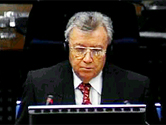 |
|
Prosecutor Geoffrey Nice asked Borisav Jović to confirm the words he had written in his second book, which described Slobodan Milošević as the key figure and main actor in what Jović called the ‘Serbian tragedy.’
"Of course, for more than a decade, Milošević was the main political figure in Serbia. He held absolute authority within the people and within the party, and he had the possibility of having a decisive role on all decisions made. And by the same token, he was in a way the main actor of everything that came to pass during that period of time."
Borisav Jović further describes Milošević’s authority in Serbia, including his authority over him:
"Mr. Milošević was the absolute authority regardless of whether he was party president or not. Not a single important decision in Serbia was taken without him nor could it have been made without him, either when I was president or when I wasn't president."
Borisav Jović, a leading Serbian political figure in the late 1980s and early 1990s, appeared as a prosecution witness under subpoena. In calling him to testify, the prosecution sought chiefly to introduce as evidence the diary he had written, entitled The Last Days of the SFRY: A Diary, as well as his second book, entitled Book on Milošević. In his diary, Jović detailed something in excess of 100 meetings he had with Slobodan Milošević from the period May 1989 until July 1992.
Jović considered himself as a close associate of Milošević, if not the closest, during many of the years relevant to the crimes that occurred in Croatia and Bosnia and Herzegovina. Throughout his testimony Jović maintained that he stood by the written statement he gave to the Office of the Prosecutor in 2002 and 2003, and everything that he wrote in his two books.
From the start of his testimony Jović made clear that Milošević was the key figure in Serbian politics. In court, Jović supported the view he extolled in his books that Milošević held absolute authority within the Socialist Party of Serbia (SPS), the dominant political party in Serbia throughout the 1990s. For a time, Milošević was unable to hold the position of SPS President because the constitution barred the same person being Serbian President and leading a political party. Jović then held the post of SPS President. However, Jović testified that Milošević was still the one who made the decisions.
Jović also confirmed statements in his books that Milošević surrounded himself with people who would obey him unquestioningly. He stated in court that Milošević was a strong personality who would naturally select people who would “be willing to carry out his decisions”. Jović also said that once a person had outlived their usefulness to Milošević “they were done away with”.
A case in point was Jović’s own dismissal from the party after he published his first book. In his statement to the Office of the Prosecutor, which he confirmed in court, Jović said, “I agreed to do it immediately because I knew that if I did not agree, he [Slobodan Milošević] would arrange for it to be done.”
Jović testified that Milošević focused on developing a personality cult and that he had asked him to stop it as the country had seen enough of this type of cult in the times of post-World War II Soviet leader Stalin and SFRY leader Tito. He said that Milošević did not really say anything to this. However, pictures of all other prominent politicians were removed but, as Jović stated, “[Milošević’s] stayed on. And the personality cult … was, therefore, even enhanced.”
Jović also testified that as part of his autocratic power Milošević had decisive control over the state media. The media was used to “elevate or undermine” other Serb leaders according to the accused’s current policy. In court, Jović gave the example of leaders such as Milan Martić and Milan Babić, both later convicted by the Tribunal of crimes in Croatia. Jović stated that when Babić raised Milošević’s ire, Milošević involved the media “in persuading the people that Babić had to be replaced because this was against the interest of the Serb people”. However, in an attempt to defend Milošević’s involvement in the media, Jović also said that “he simply thought that it was very important for state television and radio to report primarily in the interest of current politics.”
Throughout his political career Borisav Jović held various government offices mostly in social and economic development and was Ambassador to Italy in the mid to late 1970s. Later he became a powerful figure in Yugoslav politics performing a number of high profile roles and was closely aligned with Slobodan Milošević. Borisav Jović was elected in March 1989 as Serbia’s representative to the Presidency of the Socialist People’s Republic of Yugoslavia (SFRY), and later also served as its Vice-President and President. From mid-1991 until October 1992, Jović was President of the Socialist Party of Serbia (SPS), taking over from Slobodan Milošević when he had to step down for constitutional reasons. When Milošević returned to the leadership of the party Jović became its Vice-President, holding this position until November 1995. Using these experiences he wrote his two books, the first entitled “The Last Days of the SFRY: A Diary” and the second, the “Book on Milošević”. He was interviewed as a suspect by the Tribunal’s Office of the Prosecutor on three occasions in 2002 and 2003, but was not indicted.
Borisav Jović testified from 18 until 20 November 2003. The relevant transcripts can be accessed through the Cases page on this site.

